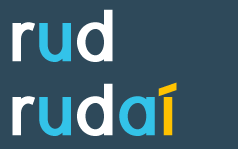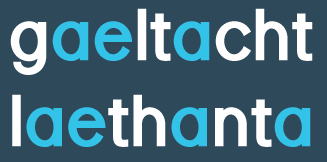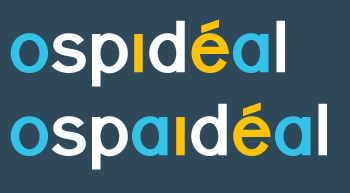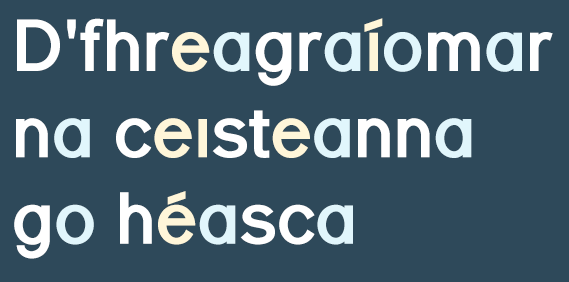I& #39;ve seen a few comments lately about the "caol le caol, leathan le leathan" rule for spelling. (Slender w/ slender, broad w/ broad). Some people have trouble remembering which vowels are slender, and when the rule applies.
In English, most people say the vowels in alphabetical order; AEIOU.
But it& #39;s worth breaking it up into slender (IE) and broad (AOU) to get your head around Irish spelling.
I used to just think of Irish websites being .ie to help me remember.
But it& #39;s worth breaking it up into slender (IE) and broad (AOU) to get your head around Irish spelling.
I used to just think of Irish websites being .ie to help me remember.
I also think it& #39;s good to see if you can let a kind of letter-colour synesthesia build up, so that mistakes stand out a bit more quickly.
(btw, this thread will be pretty annoying for people who actually have letter-colour synesthesia)
(btw, this thread will be pretty annoying for people who actually have letter-colour synesthesia)
The rule isn& #39;t about consecutive vowels in a word.
It& #39;s about the vowels either side of a consonant (or cluster of consonants). If you think of each consonant being the middle of a set of scales, you want a slender vowel on each side, or a broad vowel on each side.
It& #39;s about the vowels either side of a consonant (or cluster of consonants). If you think of each consonant being the middle of a set of scales, you want a slender vowel on each side, or a broad vowel on each side.
examples:
Some nouns take "-anna" as a plural suffix.
1) Bláth https://abs.twimg.com/emoji/v2/... draggable="false" alt="🌼" title="Blüte" aria-label="Emoji: Blüte">> bláthanna
https://abs.twimg.com/emoji/v2/... draggable="false" alt="🌼" title="Blüte" aria-label="Emoji: Blüte">> bláthanna
2) Páirc https://abs.twimg.com/emoji/v2/... draggable="false" alt="🏞️" title="Nationalpark" aria-label="Emoji: Nationalpark"> does too, but..
https://abs.twimg.com/emoji/v2/... draggable="false" alt="🏞️" title="Nationalpark" aria-label="Emoji: Nationalpark"> does too, but..
3) If we just put -anna on páirc, we& #39;ve broken THE RULE
4) So we use -eanna
(please imagine the unhappy/happy Drake meme yourself)
(It& #39;s always anna or eanna, never ianna)
Some nouns take "-anna" as a plural suffix.
1) Bláth
2) Páirc
3) If we just put -anna on páirc, we& #39;ve broken THE RULE
4) So we use -eanna
(please imagine the unhappy/happy Drake meme yourself)
(It& #39;s always anna or eanna, never ianna)
Some nouns take "-í" as a plural suffix.
1) Cailín https://abs.twimg.com/emoji/v2/... draggable="false" alt="👧" title="Mädchen" aria-label="Emoji: Mädchen"> > cailíní
https://abs.twimg.com/emoji/v2/... draggable="false" alt="👧" title="Mädchen" aria-label="Emoji: Mädchen"> > cailíní
2) So does & #39;rud& #39;, but we can& #39;t have rudí, so..
3) rudaí (again, BYODrake)
4) The word for vowel is guta. Here we can just stick an í on because it& #39;s not altering the broad-consonant-broad order in the original word
1) Cailín
2) So does & #39;rud& #39;, but we can& #39;t have rudí, so..
3) rudaí (again, BYODrake)
4) The word for vowel is guta. Here we can just stick an í on because it& #39;s not altering the broad-consonant-broad order in the original word
Where& #39;s the craic in having a rule without exceptions, though.
Here& #39;s some common ones:
AE, or Æ, is a ligature you don& #39;t really get in English any more but, in Irish, that particular combination is treated like a broad vowel.
Here& #39;s some common ones:
AE, or Æ, is a ligature you don& #39;t really get in English any more but, in Irish, that particular combination is treated like a broad vowel.
2) Ansin, anseo (and some other prepositions) are contractions so, as singular words, end up breaking the rule
3) When compound words are formed, they retain their spelling and again, as singular words, end up breaking the rule.
3) When compound words are formed, they retain their spelling and again, as singular words, end up breaking the rule.
so what& #39;s the story with ospidéal? What& #39;s its excuse?
Well... yeah. There isn& #39;t one, really.
I believe there was an attempt at some point to use ospaidéal, but ospidéal is the most-used one now.
Well... yeah. There isn& #39;t one, really.
I believe there was an attempt at some point to use ospaidéal, but ospidéal is the most-used one now.
That& #39;s it for now. Go in peace and be generally a bit less bamboozled by nice, law-abiding* Irish spelling.
(*some minor exceptions, but this rule really does hold up the majority of the time, unlike certain other languages that are just pure chaos.)
(*some minor exceptions, but this rule really does hold up the majority of the time, unlike certain other languages that are just pure chaos.)

 Read on Twitter
Read on Twitter
 > bláthanna2) Páirc https://abs.twimg.com/emoji/v2/... draggable="false" alt="🏞️" title="Nationalpark" aria-label="Emoji: Nationalpark"> does too, but..3) If we just put -anna on páirc, we& #39;ve broken THE RULE4) So we use -eanna (please imagine the unhappy/happy Drake meme yourself)(It& #39;s always anna or eanna, never ianna)" title="examples: Some nouns take "-anna" as a plural suffix. 1) Bláthhttps://abs.twimg.com/emoji/v2/... draggable="false" alt="🌼" title="Blüte" aria-label="Emoji: Blüte">> bláthanna2) Páirc https://abs.twimg.com/emoji/v2/... draggable="false" alt="🏞️" title="Nationalpark" aria-label="Emoji: Nationalpark"> does too, but..3) If we just put -anna on páirc, we& #39;ve broken THE RULE4) So we use -eanna (please imagine the unhappy/happy Drake meme yourself)(It& #39;s always anna or eanna, never ianna)">
> bláthanna2) Páirc https://abs.twimg.com/emoji/v2/... draggable="false" alt="🏞️" title="Nationalpark" aria-label="Emoji: Nationalpark"> does too, but..3) If we just put -anna on páirc, we& #39;ve broken THE RULE4) So we use -eanna (please imagine the unhappy/happy Drake meme yourself)(It& #39;s always anna or eanna, never ianna)" title="examples: Some nouns take "-anna" as a plural suffix. 1) Bláthhttps://abs.twimg.com/emoji/v2/... draggable="false" alt="🌼" title="Blüte" aria-label="Emoji: Blüte">> bláthanna2) Páirc https://abs.twimg.com/emoji/v2/... draggable="false" alt="🏞️" title="Nationalpark" aria-label="Emoji: Nationalpark"> does too, but..3) If we just put -anna on páirc, we& #39;ve broken THE RULE4) So we use -eanna (please imagine the unhappy/happy Drake meme yourself)(It& #39;s always anna or eanna, never ianna)">
 > bláthanna2) Páirc https://abs.twimg.com/emoji/v2/... draggable="false" alt="🏞️" title="Nationalpark" aria-label="Emoji: Nationalpark"> does too, but..3) If we just put -anna on páirc, we& #39;ve broken THE RULE4) So we use -eanna (please imagine the unhappy/happy Drake meme yourself)(It& #39;s always anna or eanna, never ianna)" title="examples: Some nouns take "-anna" as a plural suffix. 1) Bláthhttps://abs.twimg.com/emoji/v2/... draggable="false" alt="🌼" title="Blüte" aria-label="Emoji: Blüte">> bláthanna2) Páirc https://abs.twimg.com/emoji/v2/... draggable="false" alt="🏞️" title="Nationalpark" aria-label="Emoji: Nationalpark"> does too, but..3) If we just put -anna on páirc, we& #39;ve broken THE RULE4) So we use -eanna (please imagine the unhappy/happy Drake meme yourself)(It& #39;s always anna or eanna, never ianna)">
> bláthanna2) Páirc https://abs.twimg.com/emoji/v2/... draggable="false" alt="🏞️" title="Nationalpark" aria-label="Emoji: Nationalpark"> does too, but..3) If we just put -anna on páirc, we& #39;ve broken THE RULE4) So we use -eanna (please imagine the unhappy/happy Drake meme yourself)(It& #39;s always anna or eanna, never ianna)" title="examples: Some nouns take "-anna" as a plural suffix. 1) Bláthhttps://abs.twimg.com/emoji/v2/... draggable="false" alt="🌼" title="Blüte" aria-label="Emoji: Blüte">> bláthanna2) Páirc https://abs.twimg.com/emoji/v2/... draggable="false" alt="🏞️" title="Nationalpark" aria-label="Emoji: Nationalpark"> does too, but..3) If we just put -anna on páirc, we& #39;ve broken THE RULE4) So we use -eanna (please imagine the unhappy/happy Drake meme yourself)(It& #39;s always anna or eanna, never ianna)">
 > bláthanna2) Páirc https://abs.twimg.com/emoji/v2/... draggable="false" alt="🏞️" title="Nationalpark" aria-label="Emoji: Nationalpark"> does too, but..3) If we just put -anna on páirc, we& #39;ve broken THE RULE4) So we use -eanna (please imagine the unhappy/happy Drake meme yourself)(It& #39;s always anna or eanna, never ianna)" title="examples: Some nouns take "-anna" as a plural suffix. 1) Bláthhttps://abs.twimg.com/emoji/v2/... draggable="false" alt="🌼" title="Blüte" aria-label="Emoji: Blüte">> bláthanna2) Páirc https://abs.twimg.com/emoji/v2/... draggable="false" alt="🏞️" title="Nationalpark" aria-label="Emoji: Nationalpark"> does too, but..3) If we just put -anna on páirc, we& #39;ve broken THE RULE4) So we use -eanna (please imagine the unhappy/happy Drake meme yourself)(It& #39;s always anna or eanna, never ianna)">
> bláthanna2) Páirc https://abs.twimg.com/emoji/v2/... draggable="false" alt="🏞️" title="Nationalpark" aria-label="Emoji: Nationalpark"> does too, but..3) If we just put -anna on páirc, we& #39;ve broken THE RULE4) So we use -eanna (please imagine the unhappy/happy Drake meme yourself)(It& #39;s always anna or eanna, never ianna)" title="examples: Some nouns take "-anna" as a plural suffix. 1) Bláthhttps://abs.twimg.com/emoji/v2/... draggable="false" alt="🌼" title="Blüte" aria-label="Emoji: Blüte">> bláthanna2) Páirc https://abs.twimg.com/emoji/v2/... draggable="false" alt="🏞️" title="Nationalpark" aria-label="Emoji: Nationalpark"> does too, but..3) If we just put -anna on páirc, we& #39;ve broken THE RULE4) So we use -eanna (please imagine the unhappy/happy Drake meme yourself)(It& #39;s always anna or eanna, never ianna)">
 > bláthanna2) Páirc https://abs.twimg.com/emoji/v2/... draggable="false" alt="🏞️" title="Nationalpark" aria-label="Emoji: Nationalpark"> does too, but..3) If we just put -anna on páirc, we& #39;ve broken THE RULE4) So we use -eanna (please imagine the unhappy/happy Drake meme yourself)(It& #39;s always anna or eanna, never ianna)" title="examples: Some nouns take "-anna" as a plural suffix. 1) Bláthhttps://abs.twimg.com/emoji/v2/... draggable="false" alt="🌼" title="Blüte" aria-label="Emoji: Blüte">> bláthanna2) Páirc https://abs.twimg.com/emoji/v2/... draggable="false" alt="🏞️" title="Nationalpark" aria-label="Emoji: Nationalpark"> does too, but..3) If we just put -anna on páirc, we& #39;ve broken THE RULE4) So we use -eanna (please imagine the unhappy/happy Drake meme yourself)(It& #39;s always anna or eanna, never ianna)">
> bláthanna2) Páirc https://abs.twimg.com/emoji/v2/... draggable="false" alt="🏞️" title="Nationalpark" aria-label="Emoji: Nationalpark"> does too, but..3) If we just put -anna on páirc, we& #39;ve broken THE RULE4) So we use -eanna (please imagine the unhappy/happy Drake meme yourself)(It& #39;s always anna or eanna, never ianna)" title="examples: Some nouns take "-anna" as a plural suffix. 1) Bláthhttps://abs.twimg.com/emoji/v2/... draggable="false" alt="🌼" title="Blüte" aria-label="Emoji: Blüte">> bláthanna2) Páirc https://abs.twimg.com/emoji/v2/... draggable="false" alt="🏞️" title="Nationalpark" aria-label="Emoji: Nationalpark"> does too, but..3) If we just put -anna on páirc, we& #39;ve broken THE RULE4) So we use -eanna (please imagine the unhappy/happy Drake meme yourself)(It& #39;s always anna or eanna, never ianna)">
 > cailíní2) So does & #39;rud& #39;, but we can& #39;t have rudí, so..3) rudaí (again, BYODrake)4) The word for vowel is guta. Here we can just stick an í on because it& #39;s not altering the broad-consonant-broad order in the original word" title="Some nouns take "-í" as a plural suffix. 1) Cailín https://abs.twimg.com/emoji/v2/... draggable="false" alt="👧" title="Mädchen" aria-label="Emoji: Mädchen"> > cailíní2) So does & #39;rud& #39;, but we can& #39;t have rudí, so..3) rudaí (again, BYODrake)4) The word for vowel is guta. Here we can just stick an í on because it& #39;s not altering the broad-consonant-broad order in the original word">
> cailíní2) So does & #39;rud& #39;, but we can& #39;t have rudí, so..3) rudaí (again, BYODrake)4) The word for vowel is guta. Here we can just stick an í on because it& #39;s not altering the broad-consonant-broad order in the original word" title="Some nouns take "-í" as a plural suffix. 1) Cailín https://abs.twimg.com/emoji/v2/... draggable="false" alt="👧" title="Mädchen" aria-label="Emoji: Mädchen"> > cailíní2) So does & #39;rud& #39;, but we can& #39;t have rudí, so..3) rudaí (again, BYODrake)4) The word for vowel is guta. Here we can just stick an í on because it& #39;s not altering the broad-consonant-broad order in the original word">
 > cailíní2) So does & #39;rud& #39;, but we can& #39;t have rudí, so..3) rudaí (again, BYODrake)4) The word for vowel is guta. Here we can just stick an í on because it& #39;s not altering the broad-consonant-broad order in the original word" title="Some nouns take "-í" as a plural suffix. 1) Cailín https://abs.twimg.com/emoji/v2/... draggable="false" alt="👧" title="Mädchen" aria-label="Emoji: Mädchen"> > cailíní2) So does & #39;rud& #39;, but we can& #39;t have rudí, so..3) rudaí (again, BYODrake)4) The word for vowel is guta. Here we can just stick an í on because it& #39;s not altering the broad-consonant-broad order in the original word">
> cailíní2) So does & #39;rud& #39;, but we can& #39;t have rudí, so..3) rudaí (again, BYODrake)4) The word for vowel is guta. Here we can just stick an í on because it& #39;s not altering the broad-consonant-broad order in the original word" title="Some nouns take "-í" as a plural suffix. 1) Cailín https://abs.twimg.com/emoji/v2/... draggable="false" alt="👧" title="Mädchen" aria-label="Emoji: Mädchen"> > cailíní2) So does & #39;rud& #39;, but we can& #39;t have rudí, so..3) rudaí (again, BYODrake)4) The word for vowel is guta. Here we can just stick an í on because it& #39;s not altering the broad-consonant-broad order in the original word">
 > cailíní2) So does & #39;rud& #39;, but we can& #39;t have rudí, so..3) rudaí (again, BYODrake)4) The word for vowel is guta. Here we can just stick an í on because it& #39;s not altering the broad-consonant-broad order in the original word" title="Some nouns take "-í" as a plural suffix. 1) Cailín https://abs.twimg.com/emoji/v2/... draggable="false" alt="👧" title="Mädchen" aria-label="Emoji: Mädchen"> > cailíní2) So does & #39;rud& #39;, but we can& #39;t have rudí, so..3) rudaí (again, BYODrake)4) The word for vowel is guta. Here we can just stick an í on because it& #39;s not altering the broad-consonant-broad order in the original word">
> cailíní2) So does & #39;rud& #39;, but we can& #39;t have rudí, so..3) rudaí (again, BYODrake)4) The word for vowel is guta. Here we can just stick an í on because it& #39;s not altering the broad-consonant-broad order in the original word" title="Some nouns take "-í" as a plural suffix. 1) Cailín https://abs.twimg.com/emoji/v2/... draggable="false" alt="👧" title="Mädchen" aria-label="Emoji: Mädchen"> > cailíní2) So does & #39;rud& #39;, but we can& #39;t have rudí, so..3) rudaí (again, BYODrake)4) The word for vowel is guta. Here we can just stick an í on because it& #39;s not altering the broad-consonant-broad order in the original word">







